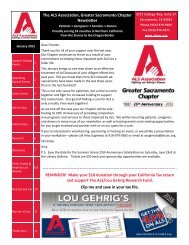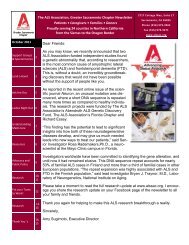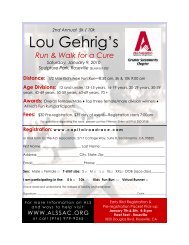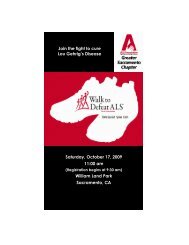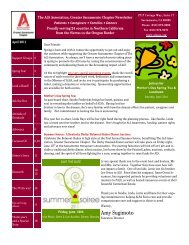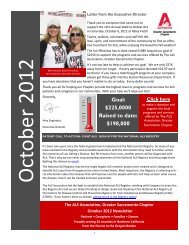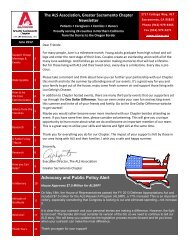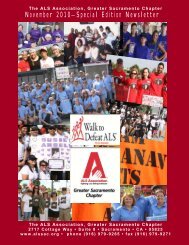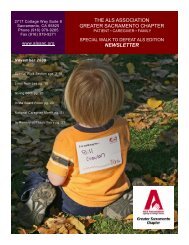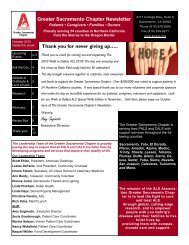The ALS Association, Greater Sacramento Chapter November 2012 ...
The ALS Association, Greater Sacramento Chapter November 2012 ...
The ALS Association, Greater Sacramento Chapter November 2012 ...
You also want an ePaper? Increase the reach of your titles
YUMPU automatically turns print PDFs into web optimized ePapers that Google loves.
Patient Interview: Cathy Speck on Karina Dreyer<br />
Here we are again, in the month traditionally known for showing<br />
our thanks—<strong>November</strong>. Since the name of my column is "Attitude of<br />
Gratitude," you might think I'm filled with gratitude. Well, you are right<br />
on! Yes indeedy! I am so thankful for all the wonderful people of our<br />
<strong>ALS</strong>SAC community. I often wonder how our incredible staff can stay so<br />
positive and energetic.<br />
Cathy Speck<br />
Cathy and Karina at the <strong>2012</strong> Walk<br />
to Defeat <strong>ALS</strong><br />
We P<strong>ALS</strong> have a unique understanding of each other, especially<br />
during the "break-out sessions." <strong>The</strong> power of Truth in our support<br />
groups is something I am thankful for. And I'm also giddy about making<br />
new friends there. Karina Dreyer, who comes off and on to our Saturday<br />
groups in <strong>Sacramento</strong> actual has PLS, not <strong>ALS</strong>. <strong>The</strong> first time I saw her at<br />
a meeting, I don't think she spoke other than to say her name. <strong>The</strong> following<br />
month during a break-out session she did speak and I was intrigued<br />
by her accent. I asked her where she was from—which country. She kindly answered "South Africa." I<br />
boldly told her that I thought her accent had some German in it, and she still kindly explained that her grandmother<br />
was German. As a youngster, Karina grew up speaking German as well as Afrikaans, the first language<br />
of South Africa.<br />
My last name, Speck, is a German word that means "bacon," and even though I'm a vegetarian, I studied<br />
German for nine years, starting in 7th grade. Karina and I quickly (no time to waste) became Germanspeaking<br />
friends, and we talked about our cognitive struggles. Cognitive effects of <strong>ALS</strong>/PLS are not well -<br />
defined, and the changes can be side-effects of medication, lack of restorative sleep, hormones and age, etc...<br />
Here is part one of Karina’s story.<br />
I grew up in Pretoria South Africa. I studied computer science at the University of Pretoria. In 1989 I<br />
married Dirk Dreyer, and we had two sons—Wiekus was born in 1993, and Christo in 1994.<br />
Dirk studied computer science at the University of Johannesburg and in 1996 we were given the opportunity<br />
to come to America to work as programmers. We were consultants in Richmond, Virginia, and after<br />
that in Denver, Colorado. And then we got green cards, so we could stay and work. And this is how we came to<br />
California. We bought a house in Roseville, Ca. We became US citizens in 2004.<br />
In 2011 I started having problems with spasticity and walking, after a seeing a lot of doctors, I was diagnosed<br />
with PLS Primary Lateral Sclerosis by the doctors at UCSF.<br />
PLS is caused primarily by degeneration of the upper motor neurons in the brain and spinal cord, which<br />
results in increasing spasticity and weakness of voluntary muscles. It is often referred to as a benign variant of<br />
Amyotrophic Lateral Sclerosis (<strong>ALS</strong>, Lou Gehrig’s disease). <strong>The</strong> primary difference between the two is that in<br />
PLS the spinal motor neurons or lower motor neurons stay intact. Thus, there is no muscle wasting<br />
(amyotrophy), which is the symptom that ultimately causes fatal complications in <strong>ALS</strong>.<br />
However, there are some slowly progressing forms of <strong>ALS</strong> that are difficult to distinguish from PLS. In<br />
fact, up to 10% of <strong>ALS</strong> patients survive more than ten years. In addition, improved medical care is resulting in<br />
longer and more productive lives for all <strong>ALS</strong> patients. For additional information on <strong>ALS</strong>, see the <strong>ALS</strong> Fact Sheet<br />
by the National Institute of Neurological Disorders and Stroke.<br />
No treatments are currently available to prevent, stop, or reverse PLS. Treatment is focused on symptom<br />
relief, such as medication to reduce spasticity; physical therapy and exercise to help maintain flexibility,<br />
strength, and range of motion; assistive devices and communications aids; and supportive therapy and other<br />
modalities.<br />
For more information on Spastic Paraplegia visit: http://sp-foundation.org/understanding-hsp-pls/pls/<br />
#Different<br />
12



